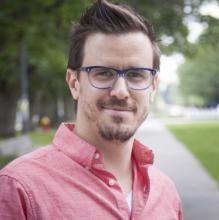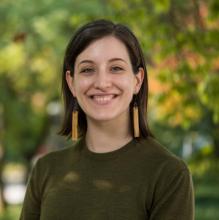Focusing on host-parasite relationships and animal behaviour, Kaylee's research uses rat genetic data to determine how rats move between blocks in Vancouver’s Downtown Eastside to assess how rat movement influences disease transmission. Kaylee is also the organizer of Nerd Nite Vancouver, a local science outreach initiative.
Research Description
Rats have been, and continue to be, the source of numerous zoonotic pathogens (i.e., pathogens transmissible to people) responsible for human morbidity and mortality in cities around the world. Several of these pathogens (including the etiologic agent of the plague) are transmitted among rats and from rats to people by fleas. Despite anecdotal evidence that rats are thriving in Canadian cities, there is little data in our country on rats and their fleas.
For my doctoral research I am studying rats and their fleas collected from Vancouver’s Downtown Eastside. Specifically I aim to: 1) determine how rat movement influences pathogen distribution among rats; and 2) describe the bacterial communities associated with fleas to look for known and novel pathogens of potential risk to human health. Knowledge gained from this research will be essential for developing informed approaches to assess, monitor, and mitigate rat-associated risks now and in the future.
What does being a Public Scholar mean to you?
Public scholarship is a communicative and mutually beneficial relationship between the public interest and academia. For me, this means that my research focuses on questions which are relevant to the public, and that its outcomes will help to address issues in the community.
In what ways do you think the PhD experience can be re-imagined with the Public Scholars Initiative?
Through its focus on community engagement, the Public Scholars Initiative will help to re-imagine the PhD by emphasizing the importance of communication between academics and community members. This kind of collaborative process will not only ensure that project aims are relevant to community members, but will also lead to a broader research approach and the creation of novel research questions.
How does your research engage with the larger community and social partners?
My research contributes to the overarching Vancouver Rat Project. The Project collaborates with various community partners including the Structural Pest Management Association of BC (SPMA) and the City of Vancouver.
Why did you decide to pursue a graduate degree?
I knew early on that I wanted to be active in the sciences. Sometime during my undergraduate degree I became particularly intrigued by the influences of urban environments on wildlife and their diseases, and I wanted to work in a field that allowed me to answer some of my many questions. I became certain of my decision to pursue academia during my MSc where I discovered a love for teaching and interacting with students.
Why did you choose to come to British Columbia and study at UBC?
I chose to study at UBC for the opportunity to work with experts in the fields of both zoology and epidemiology. UBC's Interdisciplinary Studies program has allowed for me to be a part of both departments. UBC also offered the chance to participate in the unique 'Bridge' program, which requires participants to integrate engineering, health, and policy into their research dissertations and committees.
Knowledge gained from this research will be essential for developing informed approaches to assess, monitor, and mitigate rat-associated risks now and in the future.




